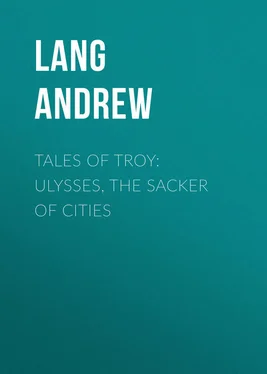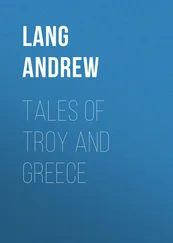Andrew Lang - Tales of Troy - Ulysses, the Sacker of Cities
Здесь есть возможность читать онлайн «Andrew Lang - Tales of Troy - Ulysses, the Sacker of Cities» — ознакомительный отрывок электронной книги совершенно бесплатно, а после прочтения отрывка купить полную версию. В некоторых случаях можно слушать аудио, скачать через торрент в формате fb2 и присутствует краткое содержание. Жанр: foreign_antique, foreign_prose, на английском языке. Описание произведения, (предисловие) а так же отзывы посетителей доступны на портале библиотеки ЛибКат.
- Название:Tales of Troy: Ulysses, the Sacker of Cities
- Автор:
- Жанр:
- Год:неизвестен
- ISBN:нет данных
- Рейтинг книги:3 / 5. Голосов: 1
-
Избранное:Добавить в избранное
- Отзывы:
-
Ваша оценка:
- 60
- 1
- 2
- 3
- 4
- 5
Tales of Troy: Ulysses, the Sacker of Cities: краткое содержание, описание и аннотация
Предлагаем к чтению аннотацию, описание, краткое содержание или предисловие (зависит от того, что написал сам автор книги «Tales of Troy: Ulysses, the Sacker of Cities»). Если вы не нашли необходимую информацию о книге — напишите в комментариях, мы постараемся отыскать её.
Tales of Troy: Ulysses, the Sacker of Cities — читать онлайн ознакомительный отрывок
Ниже представлен текст книги, разбитый по страницам. Система сохранения места последней прочитанной страницы, позволяет с удобством читать онлайн бесплатно книгу «Tales of Troy: Ulysses, the Sacker of Cities», без необходимости каждый раз заново искать на чём Вы остановились. Поставьте закладку, и сможете в любой момент перейти на страницу, на которой закончили чтение.
Интервал:
Закладка:
Andrew Lang
Tales of Troy: Ulysses, the Sacker of Cities
BATTLE AT THE SHIPS
With dawn Agamemnon awoke, and fear had gone out of his heart. He put on his armour, and arrayed the chiefs on foot in front of their chariots, and behind them came the spearmen, with the bowmen and slingers on the wings of the army. Then a great black cloud spread over the sky, and red was the rain that fell from it. The Trojans gathered on a height in the plain, and Hector, shining in armour, went here and there, in front and rear, like a star that now gleams forth and now is hidden in a cloud.
The armies rushed on each other and hewed each other down, as reapers cut their way through a field of tall corn. Neither side gave ground, though the helmets of the bravest Trojans might be seen deep in the ranks of the Greeks; and the swords of the bravest Greeks rose and fell in the ranks of the Trojans, and all the while the arrows showered like rain. But at noon-day, when the weary woodman rests from cutting trees, and takes his dinner in the quiet hills, the Greeks of the first line made a charge, Agamemnon running in front of them, and he speared two Trojans, and took their breastplates, which he laid in his chariot, and then he speared one brother of Hector and struck another down with his sword, and killed two more who vainly asked to be made prisoners of war. Footmen slew footmen, and chariot men slew chariot men, and they broke into the Trojan line as fire falls on a forest in a windy day, leaping and roaring and racing through the trees. Many an empty chariot did the horses hurry madly through the field, for the charioteers were lying dead, with the greedy vultures hovering above them, flapping their wide wings. Still Agamemnon followed and slew the hindmost Trojans, but the rest fled till they came to the gates, and the oak tree that grew outside the gates, and there they stopped.
But Hector held his hands from fighting, for in the meantime he was making his men face the enemy and form up in line and take breath, and was encouraging them, for they had retreated from the wall of the Greeks across the whole plain, past the hill that was the tomb of Ilus, a king of old, and past the place of the wild fig-tree. Much ado had Hector to rally the Trojans, but he knew that when men do turn again they are hard to beat. So it proved, for when the Trojans had rallied and formed in line, Agamemnon slew a Thracian chief who had come to fight for Troy before King Rhesus came. But the eldest brother of the slain man smote Agamemnon through the arm with his spear, and, though Agamemnon slew him in turn, his wound bled much and he was in great pain, so he leaped into his chariot and was driven back to the ships.
Then Hector gave the word to charge, as a huntsman cries on his hounds against a lion, and he rushed forward at the head of the Trojan line, slaying as he went. Nine chiefs of the Greeks he slew, and fell upon the spearmen and scattered them, as the spray of the waves is scattered by the wandering wind.
Now the ranks of the Greeks were broken, and they would have been driven among their ships and killed without mercy, had not Ulysses and Diomede stood firm in the centre, and slain four Trojan leaders. The Greeks began to come back and face their enemies in line of battle again, though Hector, who had been fighting on the Trojan right, rushed against them. But Diomede took good aim with his spear at the helmet of Hector, and struck it fairly. The spear-point did not go through the helmet, but Hector was stunned and fell; and, when he came to himself, he leaped into his chariot, and his squire drove him against the Pylians and Cretans, under Nestor and Idomeneus, who were on the left wing of the Greek army. Then Diomede fought on till Paris, who stood beside the pillar on the hillock that was the tomb of old King Ilus, sent an arrow clean through his foot. Ulysses went and stood in front of Diomede, who sat down, and Ulysses drew the arrow from his foot, and Diomede stepped into his chariot and was driven back to the ships.
Ulysses was now the only Greek chief that still fought in the centre. The Greeks all fled, and he was alone in the crowd of Trojans, who rushed on him as hounds and hunters press round a wild boar that stands at bay in a wood. “They are cowards that flee from the fight,” said Ulysses to himself; “but I will stand here, one man against a multitude.” He covered the front of his body with his great shield, that hung by a belt round his neck, and he smote four Trojans and wounded a fifth. But the brother of the wounded man drove a spear through the shield and breastplate of Ulysses, and tore clean through his side. Then Ulysses turned on this Trojan, and he fled, and Ulysses sent a spear through his shoulder and out at his breast, and he died. Ulysses dragged from his own side the spear that had wounded him, and called thrice with a great voice to the other Greeks, and Menelaus and Aias rushed to rescue him, for many Trojans were round him, like jackals round a wounded stag that a man has struck with an arrow. But Aias ran and covered the wounded Ulysses with his huge shield till he could climb into the chariot of Menelaus, who drove him back to the ships.
Meanwhile, Hector was slaying the Greeks on the left of their battle, and Paris struck the Greek surgeon, Machaon, with an arrow; and Idomeneus bade Nestor put Machaon in his chariot and drive him to Nestor’s hut, where his wound might be tended. Meanwhile, Hector sped to the centre of the line, where Aias was slaying the Trojans; but Eurypylus, a Greek chief, was wounded by an arrow from the bow of Paris, and his friends guarded him with their shields and spears.
Thus the best of the Greeks were wounded and out of the battle, save Aias, and the spearmen were in flight. Meanwhile Achilles was standing by the stern of his ship watching the defeat of the Greeks, but when he saw Machaon being carried past, sorely wounded, in the chariot of Nestor, he bade his friend Patroclus, whom he loved better than all the rest, to go and ask how Machaon did. He was sitting drinking wine with Nestor when Patroclus came, and Nestor told Patroclus how many of the chiefs were wounded, and though Patroclus was in a hurry Nestor began a very long story about his own great deeds of war, done when he was a young man. At last he bade Patroclus tell Achilles that, if he would not fight himself, he should at least send out his men under Patroclus, who should wear the splendid armour of Achilles. Then the Trojans would think that Achilles himself had returned to the battle, and they would be afraid, for none of them dared to meet Achilles hand to hand.
So Patroclus ran off to Achilles; but, on his way, he met the wounded Eurypylus, and he took him to his hut and cut the arrow out of his thigh with a knife, and washed the wound with warm water, and rubbed over it a bitter root to take the pain away. Thus he waited for some time with Eurypylus, but the advice of Nestor was in the end to cause the death of Patroclus. The battle now raged more fiercely, while Agamemnon and Diomede and Ulysses could only limp about leaning on their spears; and again Agamemnon wished to moor the ships near shore, and embark in the night and run away. But Ulysses was very angry with him, and said: “You should lead some other inglorious army, not us, who will fight on till every soul of us perish, rather than flee like cowards! Be silent, lest the soldiers hear you speaking of flight, such words as no man should utter. I wholly scorn your counsel, for the Greeks will lose heart if, in the midst of battle, you bid them launch the ships.”
Agamemnon was ashamed, and, by Diomede’s advice, the wounded kings went down to the verge of the war to encourage the others, though they were themselves unable to fight. They rallied the Greeks, and Aias led them and struck Hector full in the breast with a great rock, so that his friends carried him out of the battle to the river side, where they poured water over him, but he lay fainting on the ground, the black blood gushing up from his mouth.
Читать дальшеИнтервал:
Закладка:
Похожие книги на «Tales of Troy: Ulysses, the Sacker of Cities»
Представляем Вашему вниманию похожие книги на «Tales of Troy: Ulysses, the Sacker of Cities» списком для выбора. Мы отобрали схожую по названию и смыслу литературу в надежде предоставить читателям больше вариантов отыскать новые, интересные, ещё непрочитанные произведения.
Обсуждение, отзывы о книге «Tales of Troy: Ulysses, the Sacker of Cities» и просто собственные мнения читателей. Оставьте ваши комментарии, напишите, что Вы думаете о произведении, его смысле или главных героях. Укажите что конкретно понравилось, а что нет, и почему Вы так считаете.












